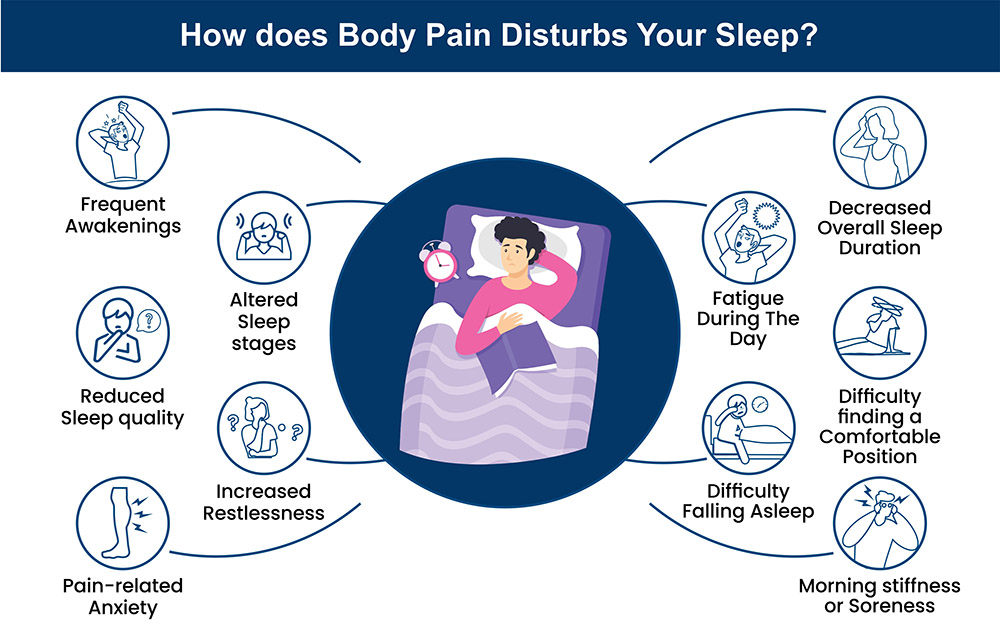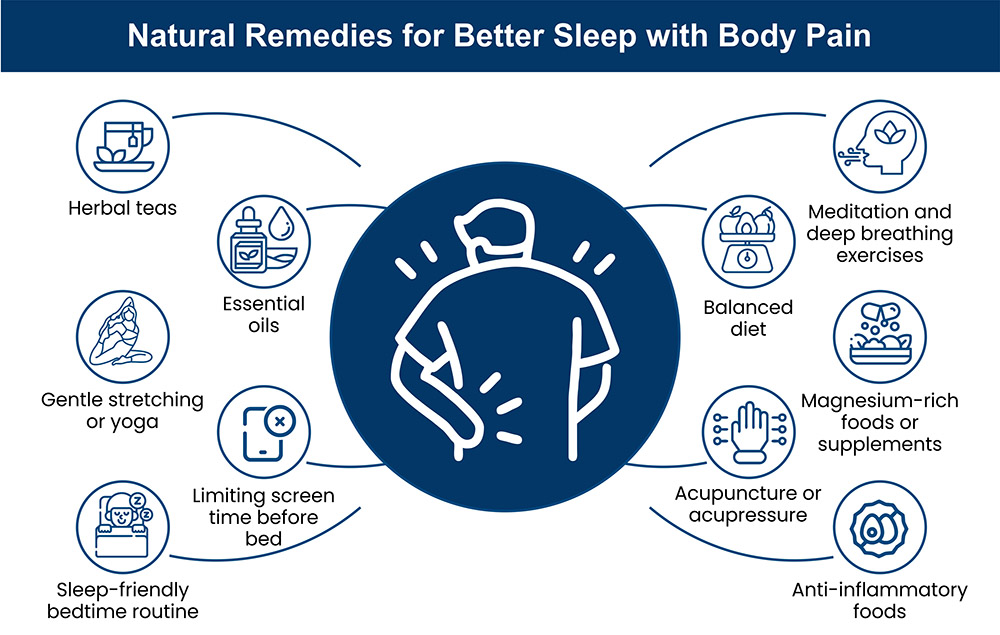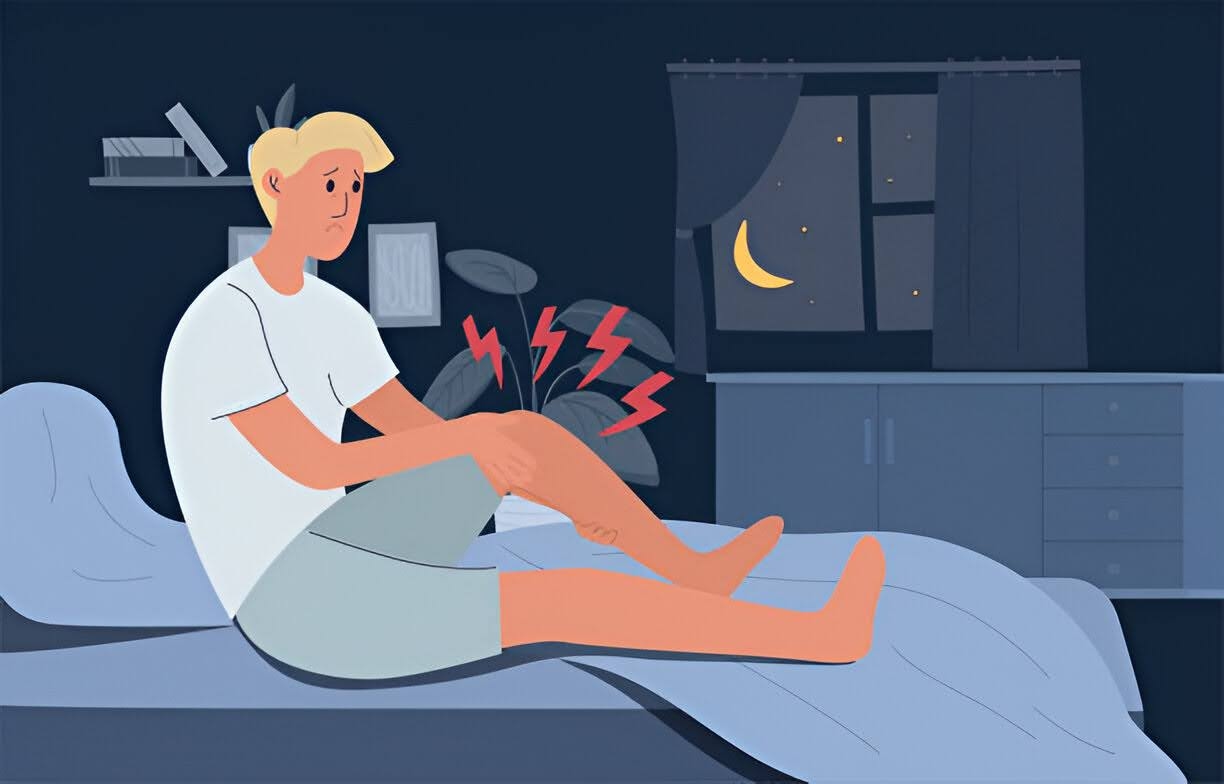Chronic pain and sleep deprivation fuel one another and form a baffling cycle, impacting so many patients. Patients with chronic pain lack adequate sleep, which would be ascribed to increased insomnia in onset or continuity. It is a two-way interdependence: while pain can quite profoundly disturb the quality and time of sleep, inadequate sleep enhances pain sensitivity, which produces a sharp increase in perceived pain.
Patients with chronic pain typically find that their issues are compounded with insomnia and sleeping disorders. Among patients with chronic pain, an estimated 50% to 80% report ongoing sleep difficulty. To treat chronic pain and sleep disturbances, it is critical to understand this complex interplay. This blog post will investigate how these two issues correlate and examine what could help break the cycle.
What Can Disrupt Your Sleep?
Types of chronic pain that can disrupt sleep, including specific examples you mentioned:
1. Sore Hips When Sleeping
Many individuals have painful hip areas, making finding an appropriate sleeping position difficult. Bursitis or arthritis may contribute to soreness, which can be painful, especially when sleeping on the side. This will disrupt sleep at night.
2. Constant Back Pain
A number of factors, such as herniated discs or muscle strain, could cause chronic back pain. It worsens throughout the night or early morning, making falling or staying asleep impossible.
3. Chronic Pelvic Pain
Conditions such as endometriosis, pelvic floor dysfunction, or chronic pelvic pain syndrome can cause persistent pelvic pain. This discomfort can be exacerbated during sleep, leading to frequent awakenings and poor sleep quality.
4. Lower Back Pain When Laying on Stomach
Sleeping on the stomach might force a person to arch his/her back, which can impede the spine, especially for individuals with lower back problems. This pose can make one restless and may even result in frequent sleep disruptions.
5. Chronic Knee Pain
Knee pain, whether from arthritis, injury, or other causes, can greatly obstruct sleep. It is hard to find a comfortable position, and the pain may become worse at night, thus affecting sleep.

What Causes Difficulty Staying Asleep?
Quite a few chronic pain patients also report not being able to sleep the whole night. Research has proven that individuals with chronic lower back pain suffer from quite a few "microarousals" (a change in sleep state to a lighter stage of sleep) per hour of sleep, which causes disturbingly frequent awakenings. Therefore, ankle joint dysfunction can result in a person waking up often at night and interfere with the normal stages of sleep.
This problem is often the cause of non-restorative sleep. People with chronic pain frequently have less sleep, more frequent wake-ups at night, and do not get sleep effectively. Accordingly, sleep is generally shallow and unsatisfactory. This non-restorative sleep pattern can also cause lower energy, sadness, weakness, and pain during the day.
6 Ways to Sleep with Chronic Pain
Here are some medical approaches to help manage sleep issues associated with chronic pain:
1. Medications
Pain Relievers: Over-the-counter options like ibuprofen or acetaminophen can help manage pain before bedtime. Prescription medications may be necessary for more severe pain.
Sleep Aids: Doctors may prescribe sleep medications such as benzodiazepines or non-benzodiazepine sedatives to help with sleep onset and maintenance.
Antidepressants: Certain antidepressants, like amitriptyline, can also help manage chronic pain and improve sleep.
2. Cognitive Behavioral Therapy for Insomnia (CBT-I)
This structured program helps individuals address thoughts and behaviors that disrupt sleep, making it particularly effective for those with chronic pain.

3. Physical Therapy
A physical therapist can develop a personalized exercise program to strengthen muscles, improve flexibility, and alleviate pain, which may enhance sleep quality.
4. Sleep Apnea Treatment
Treatments such as CPAP (continuous positive airway pressure) machines can help improve breathing during sleep if chronic pain is accompanied by sleep apnea.
5. Pain Management Programs
Multidisciplinary pain management programs can offer a combination of medication, physical therapy, and psychological support to address both pain and sleep issues.
6. Acupuncture and Alternative Therapies
Some individuals find relief through acupuncture, chiropractic care, or other alternative therapies, which may also promote better sleep.
Natural Remedies for Deep Sleep with Pain
Consider incorporating the strongest natural sleep aid into your bedtime routine to promote deep sleep despite pain. Herbal teas like chamomile and valerian root can enhance relaxation, while essential oils such as lavender and peppermint create a soothing atmosphere. Gentle stretching or restorative yoga can alleviate muscle tension; a warm bath may help soothe discomfort.
Practicing mindfulness and maintaining good sleep hygiene—such as a consistent sleep schedule and a dark, cool environment—are essential. Additionally, warm compresses on painful areas and dietary adjustments, like avoiding heavy meals and caffeine before bed, can further support better sleep. These home remedies to fall asleep quickly are highly effective but you should always consult a healthcare professional before trying new treatments.
How Can a Good Pillow Relieve Pain and Improve Your Sleep?
Spinal Alignment: Supports natural curvature, reducing strain on neck and spine.
Pressure Relief: Distributes body weight evenly, alleviating pressure points.
Comfort: Various materials and firmness options enhance overall comfort.
Temperature Regulation: Breathable designs help maintain a comfortable sleeping temperature.
Allergy Relief: Hypoallergenic materials reduce allergens, improving sleep quality.
Support for Conditions: Specialized pillows can address issues like neck pain and sleep apnea.
Reducing Snoring: Elevated designs help open airways, potentially decreasing snoring.
Tips for Choosing the Right PillowConsider Sleep Position: Choose based on whether you sleep on your side, back, or stomach.
Evaluate Material: Pick a material that meets your support and comfort preferences.
Check for Adjustability: Look for pillows that customize the fill.
Final Thoughts
The cycle of chronic pain and sleep deprivation can be challenging, but understanding their connection is vital for finding relief. Individuals can improve their sleep quality and overall well-being by identifying specific pain sources and employing various strategies—from medical treatments to natural remedies.
Choosing the right pillow can enhance comfort and support spinal alignment, while cognitive behavioral therapy and physical therapy offer additional tools for managing pain and sleep disturbances.
With patience and the right support, breaking this cycle and achieving better sleep and a higher quality of life is possible. Consult healthcare professionals for personalized advice, and remember that even small changes can lead to significant improvements.













